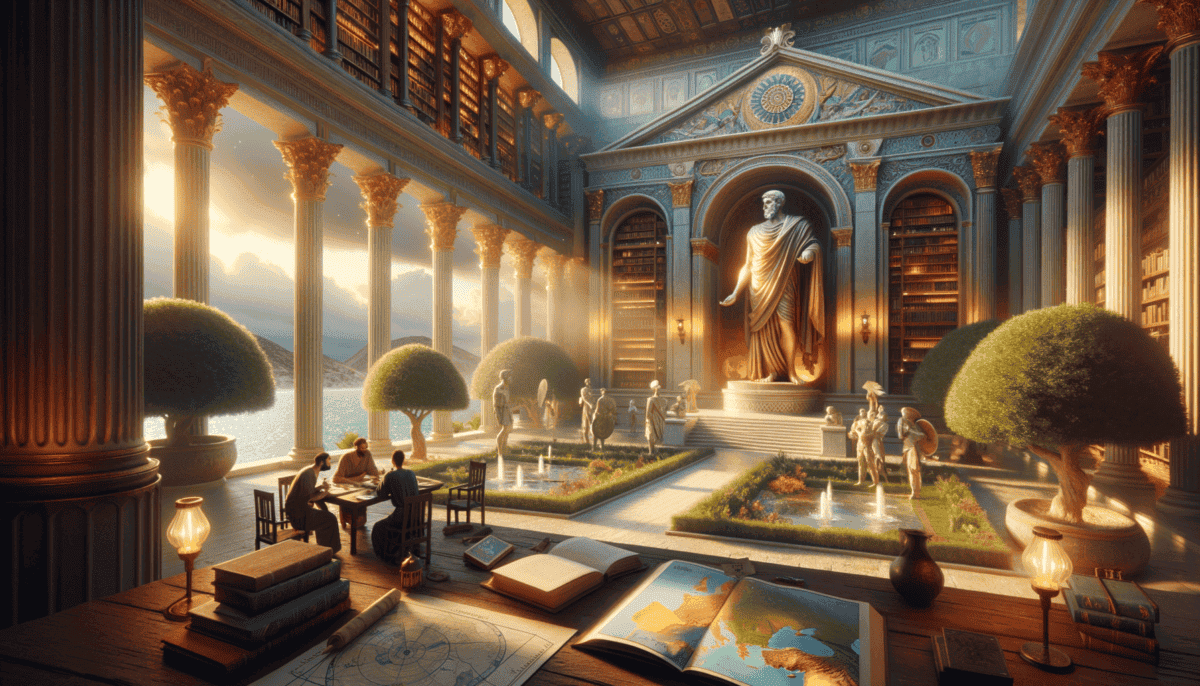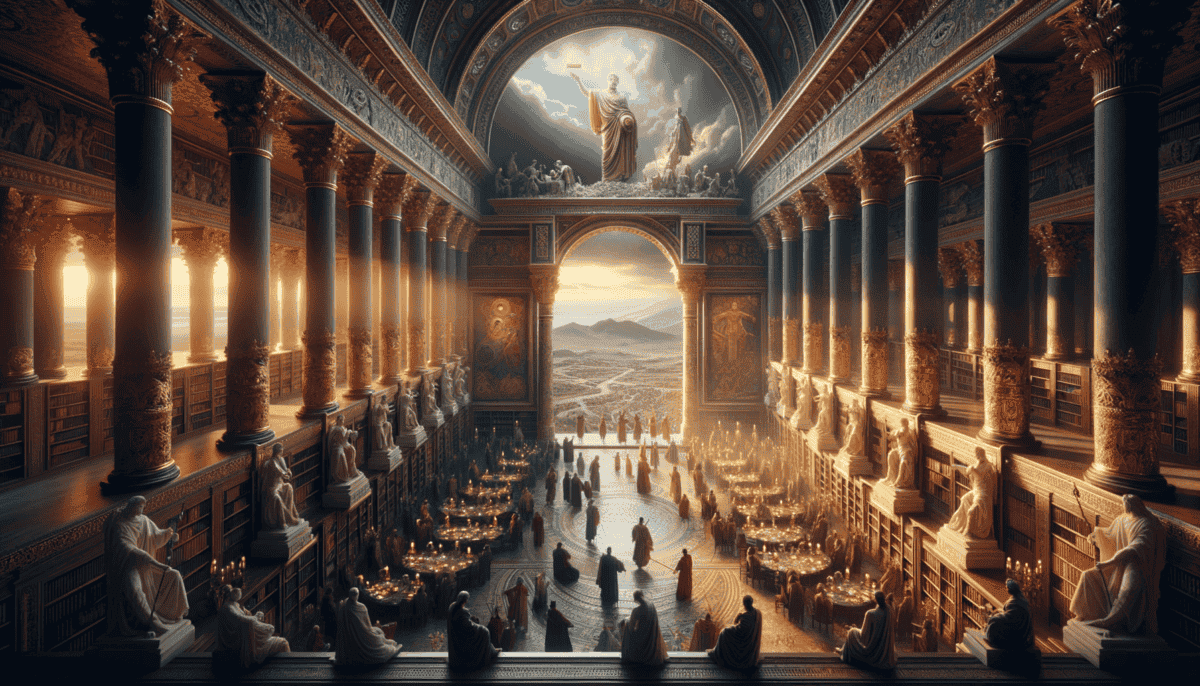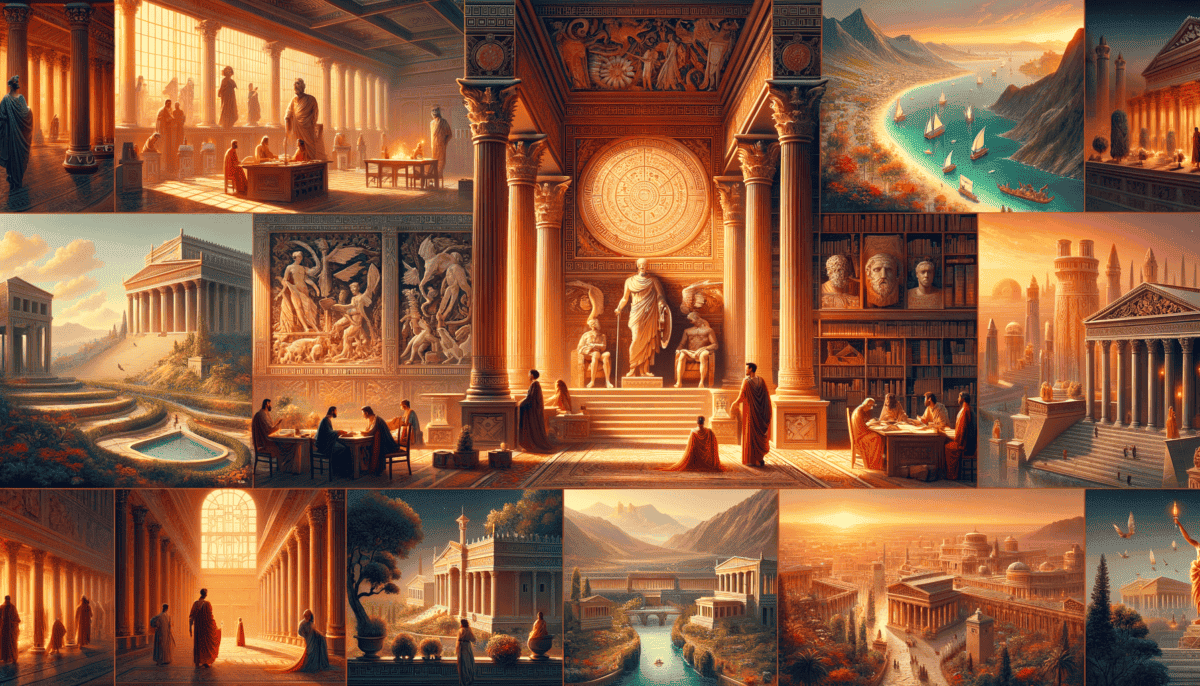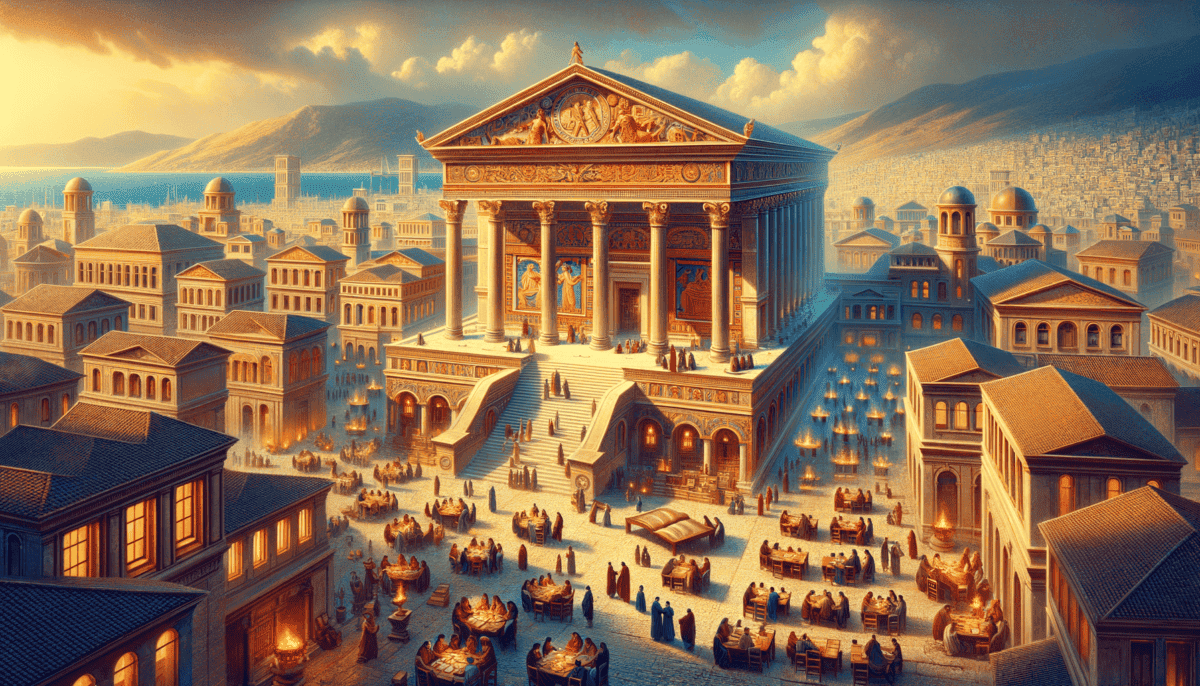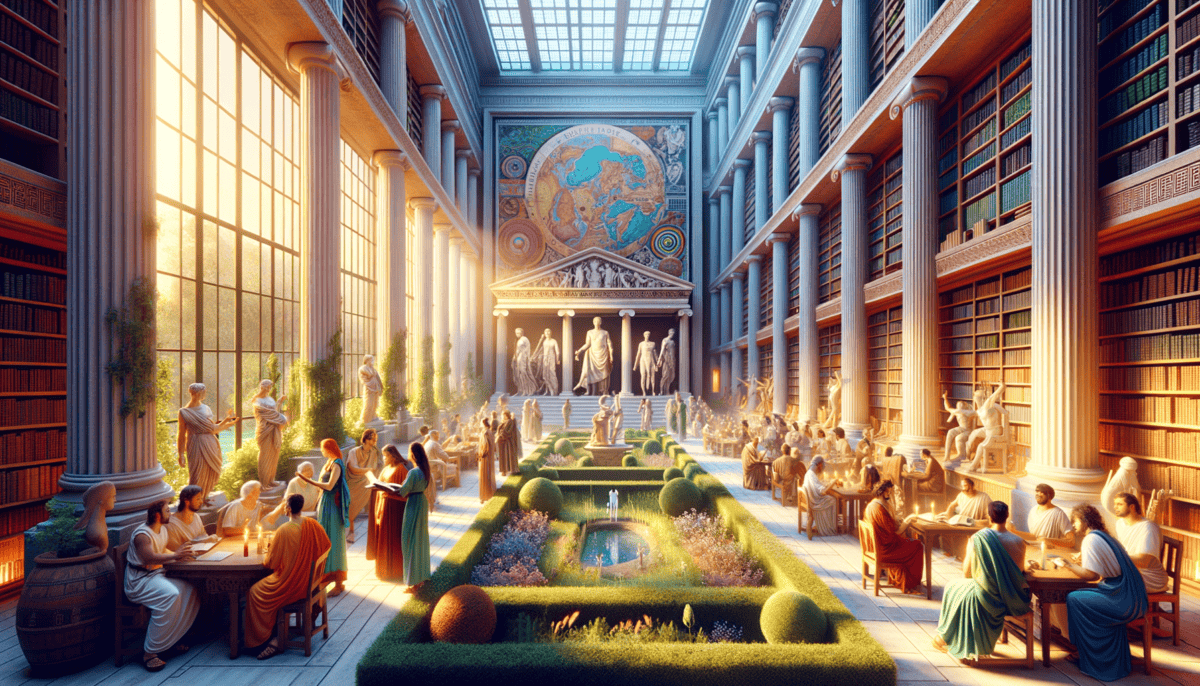The Young King’s Dream
Long ago, in a land called Macedonia, there lived a young prince named Alexander. He had bright eyes that sparkled with dreams of adventure. His golden hair shone in the sun as he ran through the palace gardens.
Fun Fact: Macedonia was a kingdom north of Greece, where people spoke Greek and loved telling stories about heroes.
Every morning, Alexander would wake up early to learn from his teacher, Aristotle. This wise man taught him about stars, animals, and faraway lands. Alexander loved these lessons more than playing with his toys.
“Tell me more about the Persian Empire,” Alexander would beg, his eyes wide with wonder.
Aristotle smiled. “It’s the biggest kingdom in the world, stretching from Egypt to India.”
Young Alexander jumped up. “One day, I’ll see all those places!”
• Reading and writing
• Stories about brave heroes
• How plants and animals live
• Ways to be a good leader
• Math and science
But life wasn’t always easy for Alexander. His father, King Philip, was a strong ruler who sometimes scared him. Philip would say, “Macedonia is too small for you, Alexander!”
One special day, something amazing happened. A wild horse named Bucephalus was brought to the palace. No one could ride him. The horse kicked and jumped, making all the grown-ups afraid.
Alexander noticed something everyone else missed. The horse was scared of his own shadow! He turned Bucephalus toward the sun, jumped on his back, and rode him perfectly.
King Philip had tears in his eyes. “My son, you must find a kingdom worthy of your greatness. Macedonia is too small for you!”
Important Moment: This showed everyone that Alexander was special. He could see things others couldn’t and wasn’t afraid to try new ways to solve problems.
As Alexander grew older, he trained with the army. He learned to fight with a sword and lead soldiers. His friends loved him because he was brave and kind.
Then one day, everything changed. King Philip was killed during a party. Alexander was only 20 years old when he became the new king.
The people whispered, “He’s too young to be king!”
But Alexander stood tall. He remembered everything Aristotle taught him. He thought about his father’s words about finding a bigger kingdom.
“I will be the best king Macedonia has ever seen,” he promised. “And I will take us on adventures beyond our dreams!”
That night, Alexander looked at the stars through his window. He thought about all the lands Aristotle told him about – Persia, Egypt, and India. His heart beat faster as he imagined visiting these places.
In his dreams that night, Alexander saw himself riding Bucephalus across deserts, through forests, and over mountains. He didn’t know it yet, but his biggest adventures were just beginning.
What Made Alexander Special: He was curious, brave, and wanted to learn about everyone and everything in the world. These qualities would help him become one of the most famous leaders in history.
Breaking the Persian Chains
Alexander stood at the edge of his camp, watching the sunrise. He was no longer just a prince – he was a king with big plans. His army stretched across the hills like a sea of shining armor. ⚔️
Fun Fact: Alexander’s army had soldiers from many different places. They spoke different languages but worked together as one team!
“Are you ready, Bucephalus?” Alexander patted his faithful horse. The black stallion stomped his hooves, eager to run.
Their first big battle was against King Darius of Persia. The Persian army was huge – like all the stars in the sky! But Alexander wasn’t scared. He had a clever plan.
“Look how they shine in the sun,” said one soldier nervously.
Alexander smiled. “The bigger they are, the harder they fall!”
• Move fast like the wind
• Surprise the enemy
• Be braver than anyone else
• Never give up
• Work together as a team
At Issus, the armies met. The ground shook as thousands of feet marched. Alexander led his soldiers right into battle, his purple cape flying behind him. The fighting was fierce!
King Darius watched from his golden chariot. When he saw Alexander charging toward him like a lightning bolt, he got scared and ran away!
“The mighty Persian king runs like a rabbit!” Alexander’s soldiers cheered.
Important Victory: Winning this battle showed everyone that Alexander was a great leader. He was smart and brave, just like his teachers knew he would be.
After the battle, Alexander traveled to Egypt. The Egyptian people welcomed him like a hero! They made him a pharaoh – a special Egyptian king.
“Let’s build a new city,” Alexander announced. “We’ll call it Alexandria. It will be a place where people from everywhere can live and learn together.”
The city grew quickly. It had:
• A huge library full of books
• Schools where kids could learn
• A lighthouse that helped ships find their way
• Markets where people traded things from far away
• Houses for people from different countries
But leading such a big army wasn’t easy. Some soldiers missed their homes. Others didn’t like working with people who spoke different languages.
“Why do we have to learn their ways?” grumbled one Macedonian soldier.
Alexander gathered everyone together. “Look around you,” he said. “Every person here has something special to teach us. When we learn from each other, we become stronger!”
Alexander’s Dream: He wanted to create a world where people from different places could live together peacefully and share their ideas.
To show he meant what he said, Alexander started wearing clothes like the Persians. He learned their language and their customs. He even married a beautiful Persian princess named Roxana.
“But you’re Greek!” some people complained.
Alexander shook his head. “I’m a citizen of the world. And so are all of you!”
Each night, Alexander would look at his maps and plan the next adventure. There were still so many places to explore, so many people to meet. His dream of bringing the world together was growing bigger every day.
Under the same stars that had watched him as a young prince, Alexander dreamed of pushing further east. Beyond the mountains, across the deserts, new lands were waiting. And he was ready to find them.
Worlds Beyond Borders
The sun beat down on Alexander’s army as they marched into unknown lands. The air was hot and dry, like standing next to a giant oven.
“How much further, my king?” asked a tired soldier.
“Until we reach the edge of the world!” Alexander’s eyes sparkled with excitement. His purple cape fluttered in the desert wind.
Amazing Journey: Alexander and his army traveled further than any Greek had ever gone before!
They crossed tall mountains covered in snow. They walked through deserts where the sand stretched as far as they could see. Each step took them to new places with new adventures. ️
In these far-away lands, they met people who looked different and spoke strange languages. Some rode on elephants instead of horses!
“Look at their colorful clothes!” whispered one soldier.
“And their spicy food!” said another, wiping his watery eyes.
• Elephants as big as houses
• Spices that made their tongues tingle
• Beautiful silk clothes
• Strange new fruits
• Cities made of mud and stone
But not everyone wanted to be friends. In India, they met a brave king named Porus who had an army of war elephants! The battle was scary and exciting.
“These elephants are like moving mountains!” shouted a scared soldier.
Alexander rode Bucephalus right up to the biggest elephant. His horse wasn’t scared at all! After a long fight, Alexander won, but he was impressed by Porus’s bravery.
Special Moment: Instead of being mean to Porus, Alexander made him a friend and let him keep ruling his land.
“How should I treat you?” Alexander asked Porus.
“Like a king,” Porus answered proudly.
Alexander smiled. “Then a king you shall remain!”
But being so far from home was hard. The soldiers were tired and missed their families. Some got sick from the strange weather. Others didn’t like the different food.
“Please, Alexander,” they begged. “Let’s go home.”
This made Alexander sad. He wanted to keep exploring, but he knew a good leader must listen to his people. He looked at his tired army and made a tough choice.
“Very well, my friends. We will start our journey home.”
Leadership Lesson: Sometimes being a good leader means putting your people’s needs before your own dreams.
On their way back, Alexander thought about all they had learned. They had seen amazing things and met interesting people. His dream of bringing different peoples together was coming true!
To help everyone get along, Alexander had a big party. He invited thousands of his soldiers to marry girls from the lands they had visited. It was the biggest wedding party ever!
“This is how we become one family,” Alexander told them. “By sharing our lives and our hearts.”
At night, Alexander would sit with people from all the different lands. They would share stories and teach each other their languages. He learned about their gods, their music, and their ways of living.
But leading such a big, mixed group wasn’t easy. Some people didn’t want to change their old ways. Others fought about who should be in charge.
“Remember,” Alexander would say, “we are stronger together than apart.”
As the stars twinkled above, Alexander dreamed bigger dreams. He had created something new – a world where Greek ideas mixed with other ways of thinking. His empire wasn’t just about land anymore. It was about bringing people together and sharing the best of what each culture had to offer.
A Kingdom Without Its King
The city of Babylon was quiet. The grand palace that usually buzzed with life now felt empty. Alexander, the great king who had conquered so much of the world, lay sick in his bed.
“How is he?” whispered Ptolemy to the doctor.
“Not good. The fever burns hot.” The doctor shook his head sadly.
Sad News: Alexander got very sick with a bad fever in Babylon when he was only 32 years old.
Alexander’s generals gathered around his bed. These strong men who had fought battles across the world now had tears in their eyes.
“Who will lead us?” asked Perdiccas, one of his closest friends.
Alexander could barely speak. He took off his ring and handed it to Perdiccas. Then he closed his eyes for the last time.
The news spread fast across the huge empire:
• Greece
• Egypt
• Persia
• Parts of India
• Many other lands
But soon, the generals started fighting. They all wanted to be the new king!
“I should rule Egypt!” shouted Ptolemy.
“The Persian lands are mine!” yelled Seleucus.
“Greece belongs to me!” declared Antipater.
Big Change: Alexander’s huge empire split into smaller kingdoms, each ruled by a different general.
Ptolemy went to Egypt. He made the city of Alexandria even more beautiful. He built a huge lighthouse that could be seen from far away at sea! ️
“This will be the greatest city in the world!” he said proudly.
Seleucus took the eastern lands, including Persia. He built new cities and helped people trade with faraway places.
“From here, we can trade with India and China!” he told his people.
Each general tried to copy Alexander’s good ideas. They:
• Built big libraries
• Made new cities
• Helped people trade
• Mixed Greek ideas with local ways
But they also fought a lot. Sometimes they were friends, sometimes enemies. It was like a big game of tag, but with armies! ♂️
Fun Fact: These new kingdoms were called “Hellenistic,” which means “Greek-like.”
In Egypt, Ptolemy’s family became very powerful. His great-great-granddaughter was the famous Queen Cleopatra!
The Seleucid kingdom grew very rich from trade. They sold things like:
• Silks from China
• Spices from India
• Gold from Central Asia
Even though Alexander was gone, his dream of mixing different cultures lived on. In all these kingdoms, people spoke Greek but also kept their own languages. They prayed to Greek gods and local gods too.
“Look at this statue,” a child might say. “It looks Greek but wears Persian clothes!”
The world had changed forever. It wasn’t just about Greeks anymore. It was about bringing the best parts of different cultures together.
Important Lesson: Even though the empire split apart, Alexander’s idea of mixing different cultures made the world richer and more interesting.
Each kingdom wrote its own story, but they all remembered the young king who had started it all. His dream of bringing people together lived on, even if his empire did not.
The Great Centers of Learning
The sun rose over Alexandria, casting golden light on the greatest library in the world. Inside, scholars from many lands worked together to learn new things.
“Look at all these scrolls!” exclaimed young Theon, a student at the library. “There must be thousands!”
Amazing Fact: The Library of Alexandria had over 500,000 scrolls! That’s like having 500,000 books in one place.
Hypatia, a wise teacher, smiled at her student. “Yes, and each one holds special knowledge. Here we have stories about the stars, numbers, plants, and much more!”
The library was like a giant school where smart people came to study. They wanted to know:
• Why do plants grow?
• How do medicines help sick people?
• What shapes can we find in nature?
“Today we’ll learn about numbers,” Hypatia said to her students. She drew shapes in the sand. ⭐
In another room, Euclid taught geometry. “See how these lines make different shapes?” he showed his students.
Cool Discovery: Euclid wrote a book about shapes that students still use today!
Outside the library, doctors learned about medicine. They studied how to make sick people feel better. ⚕️
“Mix these herbs carefully,” said Herophilus, a famous doctor. “They will help take away pain.”
At night, astronomers climbed to the roof. They looked at the stars through special tools.
“I think the Earth goes around the sun!” said Aristarchus, marking his observations on a scroll.
Big Ideas: These smart people found out many things we still use today, like:
• Ways to measure circles
• How to make better medicines
• Facts about stars and planets
People came from far away to study in Alexandria. Some spoke Greek, others Egyptian, Persian, or Indian. But they all shared their knowledge.
“In my land, we use these numbers,” said an Indian scholar, showing the symbols 1, 2, 3.
“And in our land, we know how to make this medicine,” shared a Persian doctor.
The library had a special rule: every ship that came to Alexandria had to share its books.
“Your books will be copied,” the librarians would say. “Then we’ll give them back to you.”
Fun Activity: They copied books by hand! It was like copying your favorite story word by word.
Other cities also built great places of learning. In Pergamon, they made a library almost as big as Alexandria’s. In Rhodes, they built a giant statue and studied engineering.
“Knowledge is like a light,” Hypatia often told her students. “The more we share it, the brighter it becomes.” ✨
These centers of learning changed the world. They showed that when people work together and share ideas, amazing things can happen.
Remember: The Hellenistic time was special because people from different places came together to learn and discover new things!
The ideas from these great libraries and schools spread far and wide, teaching people new ways to think about the world around them.
A World Forever Changed
The warm Mediterranean sun shone on the city of Rome. A young Roman girl named Julia walked through a garden filled with Greek statues.
“Father, why do we have so many Greek things in our home?” she asked.
Important: The Romans loved Greek ideas so much, they made them part of their own life!
Her father, Marcus, smiled. “The Greeks taught us many wonderful things. Their ideas made our world bigger and better.”
Julia looked at a map on the wall. It showed all the places where Greek ideas had spread:
• From Italy to Turkey
• All around the big blue sea
“Look how far Greek words have traveled!” Marcus pointed. “Even in far-away places, people speak some Greek words.” ️
Fun Fact: Many words we use today come from Greek, like ‘elephant’ and ‘school’!
In the streets of Rome, Julia saw Greek teachers helping children learn. Some read stories about brave heroes. Others learned about numbers and stars. ⭐
“Remember what Alexander’s teacher Aristotle said,” a teacher told his students. “Ask questions about everything you see!”
Artists worked in their shops, making beautiful things in the Greek style. They painted vases and carved statues.
Amazing Change: Greek art and buildings became popular everywhere!
In the marketplace, doctors used medicine they learned from Greek books. They helped sick people feel better. ⚕️
“These healing ways came from Alexandria,” said a doctor. “They work better than our old methods.”
Julia watched as ships came into the harbor. They brought scrolls full of Greek wisdom from far away.
“Each boat brings new ideas,” Marcus explained. “Ideas about stars, plants, animals, and how to live a good life.”
Big Ideas that Changed the World:
• How to think about big questions
• Ways to make beautiful art
• New kinds of medicine
• Better ways to build things
That evening, Julia looked at the stars. She thought about how Alexander’s big dream had changed everything.
“Father, did Alexander know his ideas would last so long?” she asked.
Marcus smiled. “Maybe not. But he showed us something important – when people share ideas, wonderful things happen.”
The world was different now. Greek ideas had mixed with other ways of thinking. This made new and better ways of doing things.
Special Message: Ideas are stronger than any empire. They last forever! ✨
Today, we still use many things the Greeks taught us. Their stories inspire us. Their questions make us think. Their love of learning shows us how to make the world better.
As the sun set over Rome, Julia knew she was part of this big story. Like the Greeks, she would always want to learn new things and ask big questions.
“Look up at those stars,” Marcus said. “The Greeks taught us their names. And as long as people look up at the night sky, their ideas will live on.”


